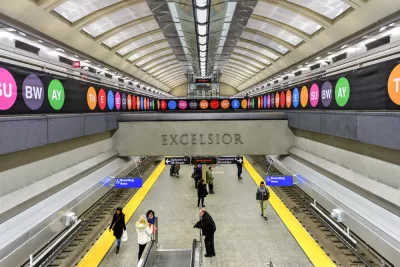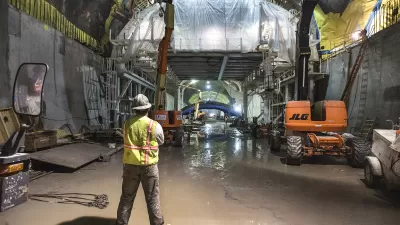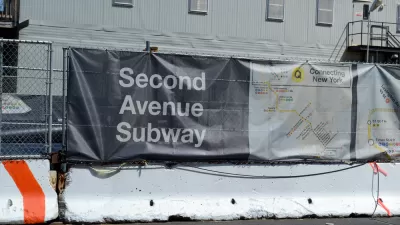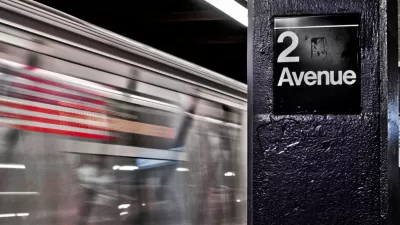Transit advocates were hoping the U.S. Government Accountability Office was finally going to expose the systematic failures of transit spending in the United States by comparing the practices of other countries.

The U.S. Government Accountability Office (GAO) has released the long-promised report [pdf] on rail transit capital investment, stopping short of the scathing indictment of systematic failures by transit agencies some advocates were hoping for in the wake of a damning New York Times article, written by Brian Rosenthal in December 2017.
According to a GAO website, the report focused on four rail transit projects as case studies, interviewing the people involved from industry and government. As quoted directly from the report (page 4):
We selected two projects currently in operation—the Utah Transit Authority’s Mid-Jordan light rail project and the Metropolitan Transit Authority of Harris County’s Houston North Corridor light rail project; and two projects currently in construction—the Los Angeles County Metropolitan Transportation Authority’s Purple Line Extension - Section 1 heavy rail project, and the Maryland Transit Administration’s Purple Line light rail project.
Those case studies yielded to recommendations directed at the Federal Transit Authority (as quoted directly from page 38 of the report):
- The FTA administrator should ensure that FTA’s cost estimating information for project sponsors is consistent with all 12 steps found in GAO’s Cost Estimating and Assessment Guide and needed for developing reliable cost estimates. [Recommendation 1]
- The FTA Administrator should provide a central, easily accessible source with all of FTA’s cost estimating information to help project sponsors improve the reliability of their cost estimates. [Recommendation 2]
With respect to the first recommendation, the GAO's investigation found that FTA's cost estimating information substantially or fully met seven of the 12 cost estimating steps outlined in GAO's "Cost Estimating and Assessment Guide," but fell short of five of the steps in that guide. The report also found that "sponsors may have difficulty identifying critical cost estimating information because it is distributed across 14 different documents available to sponsors, 11 of which are intended for FTA's oversight contractors."
The report elicited an unenthusiastic response from observers. Brian Rosenthal, who wrote the big New York Times feature investigation that inspired the report, says the GAO fell short of doing what it promised: comparing the costs of subway construction in the United States to examples in other countries.
Last year, after a NYT investigation, Congress ordered a study of why subway construction is so expensive in the US (https://t.co/qK7kxsbZNt)
Today, @USGAO released the study. But despite the congressional order, it doesn't really compare costs at all: https://t.co/WG6Z0tRPn3— Brian M. Rosenthal (@brianmrosenthal) July 22, 2019
Alon Levy, whose writing in turn inspired the New York Times investigations, responded to the report with a blog post saying the report misses the mark. Here's Levy's summary of the report:
The GAO report is out now, and unfortunately it is a total miss, for essentially the same reason the RPA’s report was a miss: it did not go outside the American (and to some extent rest-of-Anglosphere) comfort zone. Its literature review is if anything weaker than the RPA’s. Its interviews with experts are telling: out of nine mentioned on PDF-p. 47, eight live in English-speaking countries. Even when more detailed information about non-English-speaking countries is readily available, even in English, the GAO report makes little use of it. It is a lazy study, and people who ideologically believe the American federal government does not work should feel confident citing this as an example.
Levy also includes a few strong words to indict the culture of accountability (or lack thereof) that allows spending on capital investment to spiral out of control, and independent evaluators like the GAO to fall short of their stated mission: "The process of learning is humbling, and some people prefer to remain proud and ignorant."
FULL STORY: Federal Transit Administration Could Improve Information on Estimating Project Costs

Alabama: Trump Terminates Settlements for Black Communities Harmed By Raw Sewage
Trump deemed the landmark civil rights agreement “illegal DEI and environmental justice policy.”

Study: Maui’s Plan to Convert Vacation Rentals to Long-Term Housing Could Cause Nearly $1 Billion Economic Loss
The plan would reduce visitor accommodation by 25% resulting in 1,900 jobs lost.

Planetizen Federal Action Tracker
A weekly monitor of how Trump’s orders and actions are impacting planners and planning in America.

Waymo Gets Permission to Map SF’s Market Street
If allowed to operate on the traffic-restricted street, Waymo’s autonomous taxis would have a leg up over ride-hailing competitors — and counter the city’s efforts to grow bike and pedestrian on the thoroughfare.

Parklet Symposium Highlights the Success of Shared Spaces
Parklets got a boost during the Covid-19 pandemic, when the concept was translated to outdoor dining programs that offered restaurants a lifeline during the shutdown.

Federal Homelessness Agency Places Entire Staff on Leave
The U.S. Interagency Council on Homelessness is the only federal agency dedicated to preventing and ending homelessness.
Urban Design for Planners 1: Software Tools
This six-course series explores essential urban design concepts using open source software and equips planners with the tools they need to participate fully in the urban design process.
Planning for Universal Design
Learn the tools for implementing Universal Design in planning regulations.
Caltrans
Smith Gee Studio
Institute for Housing and Urban Development Studies (IHS)
City of Grandview
Harvard GSD Executive Education
Toledo-Lucas County Plan Commissions
Salt Lake City
NYU Wagner Graduate School of Public Service





























